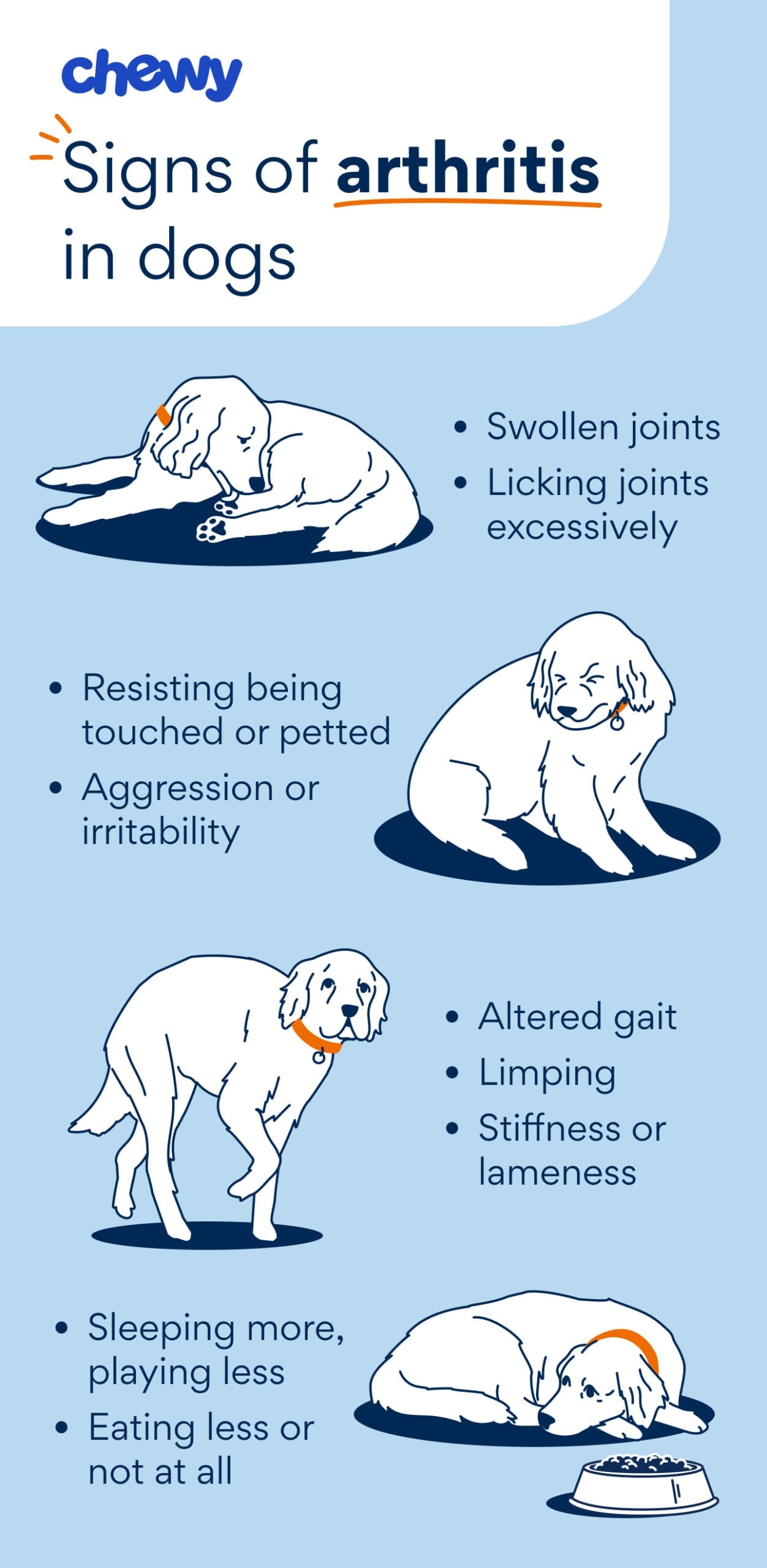Arthritis, a common condition characterized by inflammation, swelling, or tenderness in one or more joints, significantly impacts the quality of life for many aging dogs. This painful condition can stem from various factors including genetics, age, infection, disease, injury, or overuse. Fortunately, with a combination of at-home care and veterinary guidance, you can help your canine companion manage their discomfort and maintain joint health.
Implementing a multimodal treatment approach, which combines different medications and joint supplements, is the most effective strategy for managing arthritis in dogs and ensuring they lead happy, comfortable lives. Beyond medical interventions, simple modifications to your dog’s daily routine and living environment can also provide significant relief. Always consult your veterinarian before starting any new treatment plan for your dog.
Weight Management for Joint Health
Maintaining a healthy weight is crucial for alleviating joint pain in dogs. Excess weight places increased pressure on a dog’s joints, exacerbating pain and discomfort. By managing your dog’s weight, you can help ease the strain on their joints as they age. Your veterinarian can help you determine your pet’s ideal weight and develop a long-term weight management strategy.
The Role of Exercise and Physical Therapy
Moderate, consistent exercise, along with physical therapy and massage, can be highly beneficial for dogs suffering from arthritis. Aim for several short walks, about 10 to 15 minutes each, multiple times a day. Establishing a regular routine without high-impact activities like running or jumping is essential to prevent further stress or pain. For a more targeted approach, consider consulting a certified small animal physical rehabilitation practitioner. They can guide your dog through therapeutic exercises, including passive stretching, range-of-motion activities, and exercises using an underwater treadmill.
Physical therapy for dogs aims to restore or enhance mobility, function, and overall quality of life. Key goals include weight loss, pain reduction, decreased inflammation, improved range of motion, better balance, and increased muscle strength. Common physical therapy techniques include passive range of motion exercises, treadmill work (both dry and underwater), massage, and specific therapeutic exercises.
Medical and Supplement-Based Treatments
While there is no cure for arthritis in dogs, several treatments can effectively manage joint pain and inflammation.
- Librela: This is a monthly injection administered by your veterinarian, designed to treat osteoarthritis pain in dogs by targeting nerve growth factor (NGF).
- Corticosteroids: In some instances, steroids may be prescribed for short or long-term use to combat inflammation and pain associated with arthritis. It is critical to avoid using steroids concurrently with NSAIDs, as this combination can lead to serious side effects like stomach ulcers. Always inform your veterinarian about all medications your pet is currently taking.
When selecting supplements for your dog’s arthritis, look for ingredients known to support joint health, such as Methylsulfonylmethane (MSM), Glucosamine hydrochloride, long-chain omega-3 fatty acids (including EPA and DHA), Chondroitin sulfate, and Green-lipped mussel extract. For breeds prone to joint issues, it is often recommended to start joint supplements as early as eight weeks of age. Supplements and dietary additives can sometimes cause gastrointestinal upset, so always discuss them with your vet beforehand.
Certain veterinary diets are specifically formulated to support joint mobility.
Exploring Alternative Therapies
In addition to conventional treatments, alternative therapies can complement your dog’s arthritis management plan.
- Acupuncture: Clinical studies suggest that acupuncture, when used alongside a multimodal therapy approach, can significantly reduce chronic joint pain in dogs.
- Laser Therapy: This treatment uses low-level lasers to direct light into the joints, increasing oxygen and blood flow to reduce inflammation and pain.
- Shockwave Therapy: This method employs high-intensity sound waves to decrease inflammation and treat arthritis.
- Electrical Stimulation: Also known as neuromuscular stimulation, this technique helps strengthen muscles and combat muscle wasting in dogs with mobility challenges. Transcutaneous electrical nerve stimulation (TENS) is another form used for pain relief.
Lifestyle Adjustments for Comfort
Simple modifications to your home environment can greatly enhance your dog’s comfort and reduce anxiety.
- Nonslip Surfaces: Dogs with arthritis may fear slippery floors like hardwood or tile due to limited mobility and the risk of painful falls. Placing nonslip mats, rugs, or carpets on these surfaces can help your dog navigate their home more confidently. Strategically placing these rugs at the top and bottom of stairs, and near favorite resting spots like couches and beds, will minimize the impact on their joints.
- Orthopedic Dog Beds: Low-profile orthopedic dog beds can ease joint pain and make it easier for your dog to stand up. Ensure your pet’s resting areas have thick, supportive bedding with nonslip bases to prevent injury or discomfort when they move.
Creating the right arthritis management plan for your dog often involves a combination of medications, therapies, and assistive devices to ensure their comfort and happiness. The ultimate goal is to provide your beloved companion with a high quality of life and as many pain-free days as possible. Discuss the best combination of treatments with your veterinarian to tailor a plan specifically for your dog.

